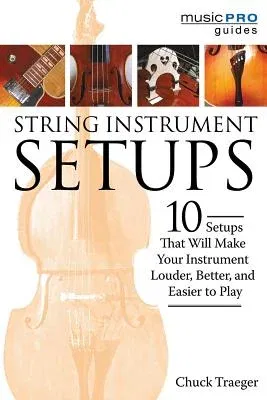String musicians, know only this: everything is vibrating. The movement
of the spheres? A guru's cryptic musing? Hypersensitivity to plate
tectonics? Not quite. This is the briefest possible distillation of
Trager's Principle, which states, When a string instrument is being
played, everything is vibrating, from the top of the scroll to the tip
of the endpin. This simple formula, the purest distillation of master
luthier Chuck Traeger's lifetime of learning, holds the key to
configuring your instrument to your specifications. It also forms the
crux of his third and final book: String Instrument Setups: 10 Setups
That Will Make Your Instrument Louder, Better, and Easier to Play. At
the height of the Big Band era, Traeger, a double bassist, performed
alongside a veritable who's who of New York jazz musicians including the
likes of Louie Armstrong and Sidney Bechet. In was in this capacity - as
Charlie Traeger, one hip cat and a regularly frustrated client of NYC's
instrument repair shops -ÿthat he began his pursuit of sonic perfection.
In 1969, satisfied with his abilities but devoted to constant
self-improvement, he opened his first repair shop. Before he knew it,
his reputation was preceding him, and he found himself handling the
instruments of school band novices and the New York Philharmonic alike.
On his seventieth birthday, Traeger retired from musicianship and
devoted himself to comprehensively documenting all he had learned about
his craft. Two decades later, shortly after he put the finishing touches
on String Instrument Setups, Chuck Traeger passed away on November 9,
2016. Scarcely a month had elapsed since the death of his beloved wife,
June, to whom he was married for over sixty blissful years. Albeit with
a heavy heart, we at Hal Leonard Books are proud to present this
remarkable man's parting gift to generations of current and future
musicians. String Instrument Setups is the culmination of forty-five
years of acoustic research involving Trager's old standby, the double
bass, and, in turn, any string instrument with a moveable bridge and a
moveable tailpiece, or one that can be made moveable. Armed with this
book, we're confident that the average musician can enter almost any
string instrument maker or repair shop in the world (the exception being
a shop that has already read String Instrument Setups), ask for their
best repair or restoration, then make that instrument sound louder,
better, and easier to play, every time. This is neither braggadocio nor
hyperbole; rather, it's the confidence instilled by one man's extensive
research, wholehearted devotion, and firm belief in the sacred bond
between instrument and musician. After reading String Instrument Setups,
we're sure you'll feel the same.

